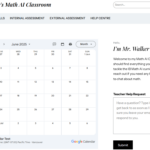Last week we had Jeff Hopkins in to speak about his innovative secondary school PSII. The Pacific School of Innovation and Inquiry is an alternative school located right here in Victoria that emphasizes cross-curricular, competency-based learning over traditional course-based learning.
Inquiry-based Learning
During my school visit last week, we tried to make rubrics for the first time and a question asked by one of my peers sticks in my mind: “how do these 3 (or 5, 6, etc) point rubrics relate back to the standard 0 to 100 scale?” I don’t think we should be thinking about how to translate our rubrics to percentages (logistically we have to, but philosophically we shouldn’t) since the point of a rubric is to assess how well students are meeting the learning objectives, not how well they test.
This makes me think of the overall goal of PSII. Obviously, they need to translate what they’re doing to meet the BC curriculum so students can graduate with a high school diploma and attend post-secondary institutions. But this is more a formality than a goal. The goal of PSII is to educate students in a way that has been proven to work. The inquiry centered approach they employ encourages students to learn what they want when they want. They build their own schedules and answer their own questions.
Instead of thinking about how this system fits with the BC curriculum, maybe we should be shifting our focus away from traditional learning and towards inquiry learning.
Over-stimulation
An interesting room that Jeff Hopkins talked about was his low stimulation room (I can’t remember his exact wording). This room can be booked by students who just need a quiet, low stimulus space to unwind for a few minutes. This approach to relaxing students’ over-worked brains has never been more relevant than right now. During the pandemic, students (myself included) can spend almost half of our day hunched over a computer, torturing our eyes.
Having a place to just be alone, with very low stimulation for a few minutes a day is a huge benefit for maintaining student stamina. Even just getting up and walking around for a minute can help refocus your attention. Taking breaks is not only good for our mental health but great for our physical health as well. Taking a moment to release some of the tension in your neck and shoulders is never a bad idea.
Featured Image
“My New Desk” by DaveFayram is licensed under CC BY 2.0







lindsayrepp
October 20, 2020 — 11:32 am
He was amazing! Brings me back to his Ted Talk that we watched at the beginning of the semester. We need to move toward a learning system that focuses on competencies; focused on knowing rather than knowing about, as he said.